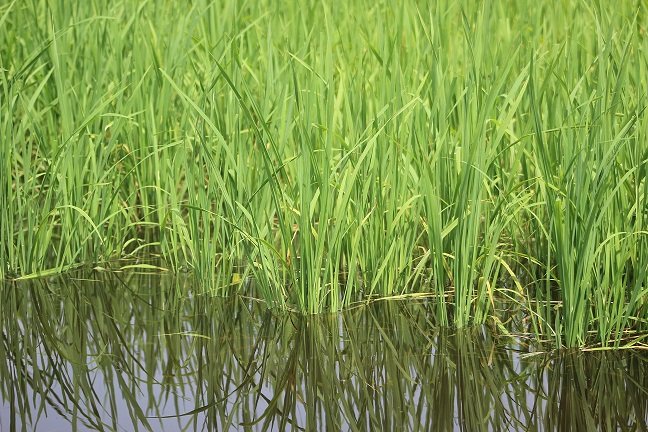Farm adopts new technology to double its yield

Adoption of the new farming technology came after an unrewarding period of farming fish at the farm, according to the farm manager, Akoi Kollie. Thanks to the EU-funded DeSIRA Integrated Rice Fish Farming System (IRFFS) project.
“We did all we could to have fish that meet the market expectation, but the fish were stunted,” he says.
Small-scale farms in Liberia are principally established to meet the nationwide demand for nutritious food and thus earn cash in return from production. But the lack of basic farm inputs, and weak extension services delivery are some factors resulting in low farm yield and income for farmers.
For Kollie, Karsor farm’s manager, the DeSIRA-IRFFS project is innovative; additionally, it helps farmers become resilient.
“During the peak of the Coronavirus outbreak, things went from bad to worse at the farm because the loss at the farm coincided with the Covid-19 outbreak in the country. The Government shut down the country, and there was not much to do as a business. The boys left the farm because we did not have money to keep them anymore,” says Kollie. “But here we are now, recovering every day, and the logistic and technical support of the DeSIRA-IRFFS project has helped us to get the farm back on track.”

From three IRFFS-ponds constructed initially, the farm’s management and DeSIRA-IRFFS project’s technical team have built ten IRFFS-ponds, anticipating a harvest of five tons of tilapia fish, 15 tons of rice annually.
Also, the Project Manager, Dr. Inoussa Akintayo, has revealed that the project has introduced soybean-based feed as a substitute for fishmeal feed. He further said that the project is monitoring soybean production at the farm.
“Fish meal is a primary protein source in aquaculture in Liberia. But farmers lack the cash to purchase such a quality feed since the cost is often high. As an alternative, the farmers use local ingredients, most times, and their leftover food to feed the fish. The problem with this is that they lack the technical understanding; they feed the fish with whatever is leftover. So with the soybean-based feed, they have the same protein ratio, and this time around, it is affordable,” says Dr. Akintayo.
What is the IRFF System?
Under this IRFF system, farmers grow rice and fish together in a pond or field. Although this farming system requires intensity, particularly when constructing the ponds, farmers reap the reward of their labors. The IRFFS is also a climate-smart technology that discourages deforestation and encourages sustainable land use, such as wetlands.
The DeSIRA-IRFF project has introduced fast-maturing vegetable cultivation as another income stream for beneficiary farmers in the integrated rice-fish farming system. For instance, farmers grow lettuce and cabbage at the fringe of the ponds and harvest them two to three times while they await the harvest of the rice and fish.
What is the DeSIRA-IRFFS project?
The DeSIRA-IRFFS project aims to improve food and nutrition security by transforming low-yielding, climate-risky traditional rice-fish production systems into more climate-resilient, high-yielding, resource-use efficient systems in Liberia. The project targets 174 household farmers and is implemented in Gbarpolu, Grand Gedeh, Maryland, Margibi, and River Gee. Africa Rice and World Fish are implementing the DeSIRA-IRFFS project in partnership with the Ministry of Agriculture (MoA), Central Agricultural Research Institute (CARI), and the National Fisheries and Aquaculture Authority (NaFAA).






Thanks, I have just been searching for information about this subject for ages and yours is the greatest I have discovered till now. But, what in regards to the conclusion? Are you positive about the supply?